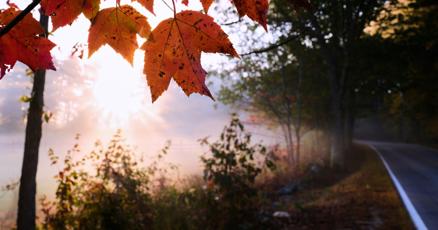Climate Crisis Threatens New England's Iconic Fall Foliage Season
Climate change and severe drought are dramatically affecting New England's fall foliage season, with earlier leaf drop and muted colors threatening this iconic autumn tradition.

Drought-stressed autumn leaves in New England showing early color change and signs of environmental impact
Drought conditions and climate change are taking a toll on one of New England's most cherished traditions - the annual fall foliage display. In Portland, Maine and across the Northeast, leaf-peeping season has arrived with concerning signs of environmental stress.
Drought's Impact on Fall Colors
More than 40% of the country is experiencing drought conditions according to the U.S. Drought Monitor, leading to premature leaf drop and muted autumn colors. The situation mirrors broader environmental challenges seen across regions like Tennessee's Great Smoky Mountains, where climate impacts are increasingly visible.
"I think it might be a little bit of a shorter and less colorful season, for the most part," says Brad Rippey, U.S. Department of Agriculture meteorologist. "The color is just not going to be there this year for some hillsides."
Climate Change's Growing Impact
The situation highlights how climate change is affecting traditional seasonal patterns. Andy Finton, senior conservation ecologist with The Nature Conservancy in Massachusetts, notes that while forests show resilience, they face mounting pressure from severe weather and heat waves - challenges that parallel broader environmental and economic disruptions affecting communities nationwide.
Tourism Industry Adapts
Despite environmental challenges, the tourism industry remains robust. New England destinations report strong bookings, though with notable shifts in visitor demographics. The Mount Washington Valley Chamber of Commerce notes an 80% decline in Canadian tourists, offset by increased domestic and international travelers.
Western States Face Similar Challenges
Colorado's Rocky Mountains are experiencing comparable issues, with drought stress causing:
- Earlier color changes
- Muted autumn hues
- Premature leaf drop
- Stressed tree health conditions
This environmental shift serves as a stark reminder of climate change's tangible impacts on beloved natural phenomena and the urgent need for climate action.
Rachel Whitman
Rachel L. Whitman is a political columnist and investigative journalist based in Washington, D.C. Her writing focuses on democratic resilience, civil rights, and the intersection of technology and public policy. With a background in law and public affairs, she brings sharp analysis and a deep commitment to progressive values.
